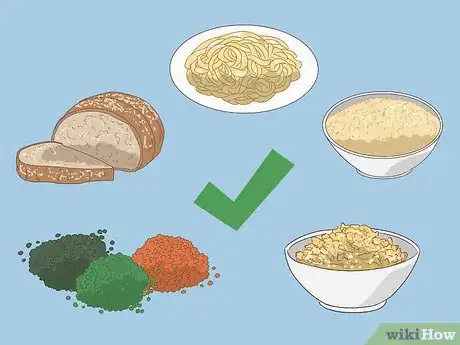This article was co-authored by Monica Moreno, MS, RD, LD/N. Monica Moreno is a Registered Dietitian and the Founder, Owner, and Lead Dietitian at Essence Nutrition in Miami, Florida. Monica specializes in nutrition consulting and school and corporate wellness programs. She holds a BA from The University of Florida and an MS in Dietetics and Nutrition from Florida International University. Monica was the dietitian for the Miami Marlins for close to 5 years, and she is currently visiting dietitian specialist at Ocean Reef Resort and Club. Monica is a member of the Academy of Nutrition and Dietetics, Nutrition Entrepreneurs Dietetics Practice Group, Integrative Nutrition Dietetics Practice Group, Collegiate and Professionals Sports Dietitians Association, and Weight Management Dietetic Practice Group. She was awarded the 2020 Coral Gables Chamber of Commerce Business Woman in Healthcare of the Year award.
There are 18 references cited in this article, which can be found at the bottom of the page.
wikiHow marks an article as reader-approved once it receives enough positive feedback. This article received 15 testimonials and 93% of readers who voted found it helpful, earning it our reader-approved status.
This article has been viewed 216,438 times.
An A1C test effectively measures your average blood sugar levels over the past 3 months. A doctor can measure your A1C levels to diagnose and treat pre-diabetes and diabetes. Lower levels of A1C are associated with lower risks of diabetes-related complications. If you’re diabetic or at risk of becoming diabetic, try some of the tips on this list to lower your A1C levels and start leading a healthier lifestyle today!
Steps
Expert Q&A
-
QuestionHow much cinnamon should I take to lower my A1C?
 Monica Moreno, MS, RD, LD/NMonica Moreno is a Registered Dietitian and the Founder, Owner, and Lead Dietitian at Essence Nutrition in Miami, Florida. Monica specializes in nutrition consulting and school and corporate wellness programs. She holds a BA from The University of Florida and an MS in Dietetics and Nutrition from Florida International University. Monica was the dietitian for the Miami Marlins for close to 5 years, and she is currently visiting dietitian specialist at Ocean Reef Resort and Club. Monica is a member of the Academy of Nutrition and Dietetics, Nutrition Entrepreneurs Dietetics Practice Group, Integrative Nutrition Dietetics Practice Group, Collegiate and Professionals Sports Dietitians Association, and Weight Management Dietetic Practice Group. She was awarded the 2020 Coral Gables Chamber of Commerce Business Woman in Healthcare of the Year award.
Monica Moreno, MS, RD, LD/NMonica Moreno is a Registered Dietitian and the Founder, Owner, and Lead Dietitian at Essence Nutrition in Miami, Florida. Monica specializes in nutrition consulting and school and corporate wellness programs. She holds a BA from The University of Florida and an MS in Dietetics and Nutrition from Florida International University. Monica was the dietitian for the Miami Marlins for close to 5 years, and she is currently visiting dietitian specialist at Ocean Reef Resort and Club. Monica is a member of the Academy of Nutrition and Dietetics, Nutrition Entrepreneurs Dietetics Practice Group, Integrative Nutrition Dietetics Practice Group, Collegiate and Professionals Sports Dietitians Association, and Weight Management Dietetic Practice Group. She was awarded the 2020 Coral Gables Chamber of Commerce Business Woman in Healthcare of the Year award.
Registered Dietitian You shouldn't rely on cinnamon to lower your A1C levels. Some studies do show that cinnamon can lower your blood sugar, but it really comes down to long-term, strategic eating habits, not eating/drinking a specific food.
You shouldn't rely on cinnamon to lower your A1C levels. Some studies do show that cinnamon can lower your blood sugar, but it really comes down to long-term, strategic eating habits, not eating/drinking a specific food. -
QuestionWhat foods can I eat to lower my A1C?
 Monica Moreno, MS, RD, LD/NMonica Moreno is a Registered Dietitian and the Founder, Owner, and Lead Dietitian at Essence Nutrition in Miami, Florida. Monica specializes in nutrition consulting and school and corporate wellness programs. She holds a BA from The University of Florida and an MS in Dietetics and Nutrition from Florida International University. Monica was the dietitian for the Miami Marlins for close to 5 years, and she is currently visiting dietitian specialist at Ocean Reef Resort and Club. Monica is a member of the Academy of Nutrition and Dietetics, Nutrition Entrepreneurs Dietetics Practice Group, Integrative Nutrition Dietetics Practice Group, Collegiate and Professionals Sports Dietitians Association, and Weight Management Dietetic Practice Group. She was awarded the 2020 Coral Gables Chamber of Commerce Business Woman in Healthcare of the Year award.
Monica Moreno, MS, RD, LD/NMonica Moreno is a Registered Dietitian and the Founder, Owner, and Lead Dietitian at Essence Nutrition in Miami, Florida. Monica specializes in nutrition consulting and school and corporate wellness programs. She holds a BA from The University of Florida and an MS in Dietetics and Nutrition from Florida International University. Monica was the dietitian for the Miami Marlins for close to 5 years, and she is currently visiting dietitian specialist at Ocean Reef Resort and Club. Monica is a member of the Academy of Nutrition and Dietetics, Nutrition Entrepreneurs Dietetics Practice Group, Integrative Nutrition Dietetics Practice Group, Collegiate and Professionals Sports Dietitians Association, and Weight Management Dietetic Practice Group. She was awarded the 2020 Coral Gables Chamber of Commerce Business Woman in Healthcare of the Year award.
Registered Dietitian Lowering your A1C levels is more about what combination of foods you're eating. Try to pair your carbs with protein, fat, and fiber—this helps reduce your body's glycemic response.
Lowering your A1C levels is more about what combination of foods you're eating. Try to pair your carbs with protein, fat, and fiber—this helps reduce your body's glycemic response. -
QuestionWhat is the best fruit to lower A1C?
 Monica Moreno, MS, RD, LD/NMonica Moreno is a Registered Dietitian and the Founder, Owner, and Lead Dietitian at Essence Nutrition in Miami, Florida. Monica specializes in nutrition consulting and school and corporate wellness programs. She holds a BA from The University of Florida and an MS in Dietetics and Nutrition from Florida International University. Monica was the dietitian for the Miami Marlins for close to 5 years, and she is currently visiting dietitian specialist at Ocean Reef Resort and Club. Monica is a member of the Academy of Nutrition and Dietetics, Nutrition Entrepreneurs Dietetics Practice Group, Integrative Nutrition Dietetics Practice Group, Collegiate and Professionals Sports Dietitians Association, and Weight Management Dietetic Practice Group. She was awarded the 2020 Coral Gables Chamber of Commerce Business Woman in Healthcare of the Year award.
Monica Moreno, MS, RD, LD/NMonica Moreno is a Registered Dietitian and the Founder, Owner, and Lead Dietitian at Essence Nutrition in Miami, Florida. Monica specializes in nutrition consulting and school and corporate wellness programs. She holds a BA from The University of Florida and an MS in Dietetics and Nutrition from Florida International University. Monica was the dietitian for the Miami Marlins for close to 5 years, and she is currently visiting dietitian specialist at Ocean Reef Resort and Club. Monica is a member of the Academy of Nutrition and Dietetics, Nutrition Entrepreneurs Dietetics Practice Group, Integrative Nutrition Dietetics Practice Group, Collegiate and Professionals Sports Dietitians Association, and Weight Management Dietetic Practice Group. She was awarded the 2020 Coral Gables Chamber of Commerce Business Woman in Healthcare of the Year award.
Registered Dietitian Berries are a great choice since they're high in fiber and low in sugar. This doesn't mean that sugary fruits are off the table, though! Just make sure that you're pairing a small portion of a sugary fruit (like mango) with protein, fat, or fiber (like Greek yogurt).
Berries are a great choice since they're high in fiber and low in sugar. This doesn't mean that sugary fruits are off the table, though! Just make sure that you're pairing a small portion of a sugary fruit (like mango) with protein, fat, or fiber (like Greek yogurt).
References
- ↑ Monica Moreno, MS, RD, LD/N. Registered Dietitian. Expert Interview. 4 August 2021.
- ↑ https://www.webmd.com/diabetes/tips-to-lower-a1c
- ↑ https://www.nhs.uk/common-health-questions/food-and-diet/what-should-my-daily-intake-of-calories-be/
- ↑ https://www.mayoclinic.org/healthy-lifestyle/weight-loss/in-depth/calories/art-20048065
- ↑ https://www.canr.msu.edu/news/portion_control_and_prediabetes
- ↑ https://www.mayoclinic.org/healthy-lifestyle/nutrition-and-healthy-eating/in-depth/water/art-20044256
- ↑ Monica Moreno, MS, RD, LD/N. Registered Dietitian. Expert Interview. 4 August 2021.
- ↑ https://www.cdc.gov/diabetes/managing/manage-blood-sugar.html
- ↑ https://www.mayoclinic.org/healthy-lifestyle/nutrition-and-healthy-eating/in-depth/carbohydrates/art-20045705
- ↑ Monica Moreno, MS, RD, LD/N. Registered Dietitian. Expert Interview. 4 August 2021.
- ↑ https://www.uofmhealth.org/health-library/uq1238abc
- ↑ https://www.ncbi.nlm.nih.gov/pmc/articles/PMC5466941/
- ↑ https://www.webmd.com/diabetes/keto-diet-for-diabetes
- ↑ https://www.ncbi.nlm.nih.gov/pmc/articles/PMC6566854/
- ↑ Monica Moreno, MS, RD, LD/N. Registered Dietitian. Expert Interview. 4 August 2021.
- ↑ https://www.mayoclinic.org/healthy-lifestyle/fitness/expert-answers/exercise/faq-20057916
- ↑ https://www.ncbi.nlm.nih.gov/pmc/articles/PMC4936828/
- ↑ https://care.diabetesjournals.org/content/33/8/1859
- ↑ https://hopkinsdiabetesinfo.org/medications-for-type-2-diabetes-metformin/
- ↑ https://www.cdc.gov/diabetes/managing/managing-blood-sugar/a1c.html
- ↑ https://health.clevelandclinic.org/can-taking-cinnamon-lower-your-blood-sugar/
About This Article
To lower A1C levels, increase your consumption of veggies, fruits, beans, nuts, and fish and reduce your intake of high-fat, high-cholesterol foods. Drink plenty of water to stay hydrated, and try to perform at least 30 minutes of physical activity every day. Deep breathing, yoga, and meditation can help reduce levels of stress and anxiety, both of which contribute to higher A1C levels. Be sure to take your diabetes medications as prescribed and see your doctor if you have any questions or concerns. For more tips on making healthy lifestyle changes that affect A1C levels, read on!


































































Medical Disclaimer
The content of this article is not intended to be a substitute for professional medical advice, examination, diagnosis, or treatment. You should always contact your doctor or other qualified healthcare professional before starting, changing, or stopping any kind of health treatment.
Read More...